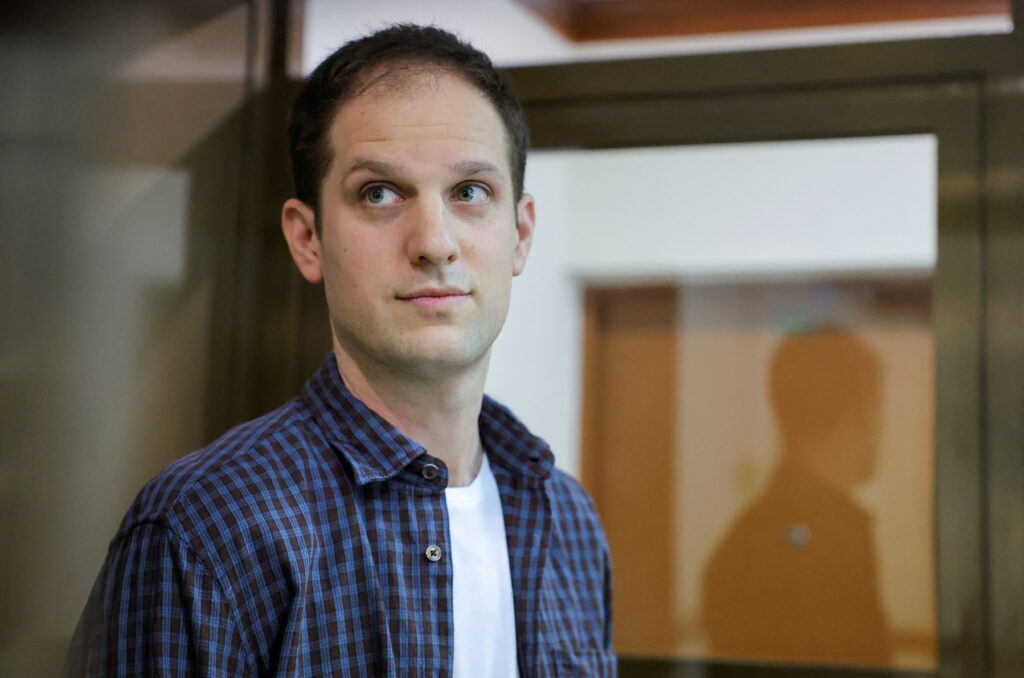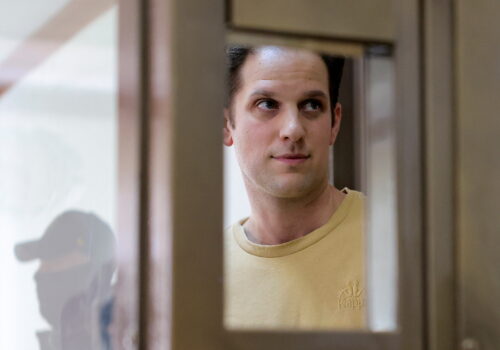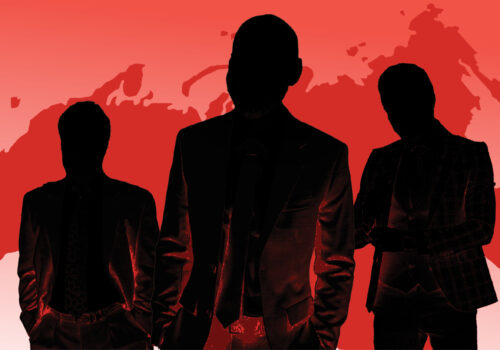You can recognize evil through its victims.
Among them, you’ll find the courageous, the indomitable, and the committed.
Count Alexei Navalny, the lawyer and opposition leader who died in prison a little more than a month ago at age forty-seven, in the first category. The Ukrainian people, now into their third year of a criminal full-scale war, represent indomitable resistance to murderous, territorial expansion.
Never forget, however, the armies of the committed, individuals whose lives and work run up against autocratic whim, individuals who collectively form the civil society that fuels democracy and threatens despots.
The Wall Street Journal honored one such individual, thirty-two-year-old Evan Gershkovich, in dramatic fashion today. It is the first anniversary of Russia’s imprisonment of Gershkovich, an accredited reporter who stands falsely accused of espionage. His value to Russian President Vladimir Putin is as a hostage for eventual trade—and as a deterrent to Western media, many of which have pulled their reporters from Russia or severely limited their work.
The five-column, page-one, all-caps headline read “ONE YEAR STOLEN: HIS STORY SHOULD BE HERE.” Beneath it, down most of the page and across five full columns, is only white space, a monument to the buoyant spirit of Gershkovich and, of course, so many others. As another story that anchored the bottom of the page reports, “Authoritarians Threaten Journalists Around Globe.”
“His Story Should Be Here”
— WSJ Communications (@WSJPR) March 29, 2024
Today’s front page of The Wall Street Journal.
One year stolen. We will not rest until Evan Gershkovich is free.#IStandWithEvan pic.twitter.com/SVsezqwzS7
Today’s edition makes for an inspiration and a collector’s item for all those who love freedom. Perhaps more important, don’t miss the investigative page-one story from yesterday’s edition. It reported on Oval Office talks between US President Joe Biden and German Chancellor Olaf Scholz aimed at freeing Evan as part of a prisoner swap that would have included Navalny in exchange for Vadim Krasikov, a Russian hit man serving a life sentence in Germany.
One week after that meeting, word of which reached the Kremlin through an intermediary, Navalny died of what only the most cynical would call natural causes.
“It happens,” Putin remarked to reporters the night after Russia’s presidential election. “There is nothing you can do about it. It’s life.”
I spent a quarter of a century working for the Wall Street Journal, much of it reporting from the front lines of freedom, including Moscow, Warsaw, Berlin, Beijing, Kabul, Beirut, Baghdad, and Panama City. Everything I learned tells me this: Forgetting Evan would be as short-sighted as abandoning Ukraine.
The forces of good won the Cold War because of a consistent US and allied effort. That’s precisely what’s lacking now, in the face of a gathering threat. The United States and its partners have the tools to build upon the Cold War’s victory, but it’s not yet clear they have the will.
One can only hope the Wall Street Journal can fill that white space soon with more uplifting stories about the courageous, the indomitable, and the committed. The future depends on it.
Frederick Kempe is president and chief executive officer of the Atlantic Council. You can follow him on Twitter: @FredKempe.
This edition is part of Frederick Kempe’s Inflection Points Today newsletter, a column of quick-hit insights on a world in transition. To receive this newsletter throughout the week, sign up here.
Further reading
Fri, Mar 29, 2024
A year in detention: Russia must release Evan Gershkovich
New Atlanticist By Mercedes Sapuppo
Gershkovich embodies what Putin apparently fears: He is a journalist working to uncover the truth, to show the world for what it really is.
Thu, Mar 14, 2024
All the autocrat’s men: The court politics of Putin’s inner circle
Russia Tomorrow By Mikhail Zygar
A new Atlantic Council report by journalist Mikhail Zygar explores how Russia's war on Ukraine has affected Vladimir Putin's inner circle.
Thu, Mar 28, 2024
The axis of evasion: Behind China’s oil trade with Iran and Russia
New Atlanticist By Kimberly Donovan, Maia Nikoladze
Beijing has developed a way to import Iranian and Russian oil while bypassing the Western financial system and shipping services.
Image: Wall Street Journal reporter Evan Gershkovich stands inside an enclosure for defendants before a court hearing to consider an appeal against his pre-trial detention on espionage charges in Moscow, Russia, October 10, 2023. REUTERS/Evgenia Novozhenina



